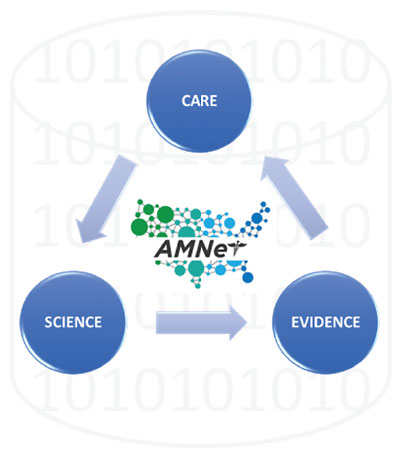APA is collaborating with two major addiction organizations to develop a network based on evidence-based care to combat the ongoing opioid epidemic.
The organizations that are participating in the network, called the Addiction Medicine Practice-Based Research Network (AMNet), are the American Society of Addiction Medicine (ASAM) and the Friends Research Institute (FRI). The three-year cooperative agreement is funded by the National Institute on Drug Abuse (NIDA).
AMNet will leverage PsychPRO—APA’s national mental health registry—to improve the quality of care for patients with opioid use disorder (OUD) across a variety of settings and serve as a platform for practice-based research aimed at developing more effective treatments.
The collaborators hope to recruit 120 practitioners to join AMNet over the next two years. APA and its partners will reach out through email campaigns, news articles, peer-reviewed journal articles, website advertising, and social media posts.
(Existing members of PsychPRO need to “opt in” to AMNet to participate in this special effort around OUD.)
“This is an extraordinary collaboration that can make a meaningful difference in the opioid epidemic, which continues to exact an enormous toll on Americans in human suffering and economic cost,” said APA CEO and Medical Director Saul Levin, M.D., M.P.A.
“A multipronged approach that includes understanding the characteristics of individuals with OUD, improving the quality of OUD care, and research to drive development of more effective treatments are key to combating this epidemic,” said Levin. “AMNet provides a unique opportunity to accomplish these goals. APA is proud to participate in this project through PsychPRO.”
About 450,000 Americans died by opioid overdose between 1999 and 2018, and opioid misuse and addiction continue to be a significant problem for the country. According to the Centers for Disease Control and Prevention, misuse of and addiction to opioids—including heroin, opioid analgesics, and fentanyl and its analogs—impart a significant economic burden on the United States in terms of lost productivity, addiction treatment, and criminal justice involvement.
Participants in the AMNet network will use PsychPRO to create a de-identified dataset that can be used to describe patient characteristics, create benchmarks for outcomes, and serve as a platform for future research. AMNet will also offer the participating practices CME-approved webinars related to the treatment of opioid and other substance use disorders, addiction research methods and human subjects protection, and quality measurement.
Development of AMNet is co-led by Diana Clarke, Ph.D., deputy director of research and senior epidemiologist/ research statistician at APA; Maureen Boyle, Ph.D., chief quality and science officer at ASAM; and Robert Schwartz, M.D., medical director of FRI and principal investigator of the cooperative agreement grant. They have assembled a steering committee composed of experts in addiction psychiatry and addiction medicine; Amy Goldstein, Ph.D., the NIDA Science Officer; a patient representative; a representative of two other federal agencies; and Debbie Gibson, M.Sc., deputy director of PsychPRO.
The steering committee—which also includes the co-leads (Clarke, Boyle, and Schwartz) and their co-investigators Frank Vocci, Ph.D., president and senior research scientist at FRI, and Anna Pagano, Ph.D., director of science at ASAM—will ensure that AMNet is evidence based and relevant to patients.
“AMNet will provide practitioners with the tools they need to improve their patient outcomes while affording the opportunity to practitioners and patients alike to participate in clinical research aimed at addressing the opioid epidemic,” Schwartz said.
Carlos Blanco, M.D., Ph.D., director of the Division of Epidemiology, Services, and Prevention Research at NIDA, told Psychiatric News that the project “fits exceptionally well with NIDA’s mission of funding research that is directly relevant for clinicians and leads to better outcomes.”
Blanco said, “The cooperative nature of the initiative will enable all participant organizations to pool our resources and increase the project’s diversity, strengthen its scientific foundations, and ensure that its findings are adopted in clinical practice.”
ASAM President Paul Early, M.D., added, “Clinician and patient participation in the registry will move us closer to our goals of refining standard quality metrics and promoting measurement-based care.”
Levin noted that many patients with OUD receive their treatment in office-based practices, yet relatively little research has been conducted in these settings.
“The great strength and promise of this effort is that it will draw on the experience of experts on the ground—the specialists who are treating patients with OUD and other substance use disorders every day,” said Levin.
“I urge members to participate in this extraordinary partnership that promises to really make a dent in our national opioid crisis,” he said. ■
Information about AMNET and how to become a participating practitioner is posted
here.

